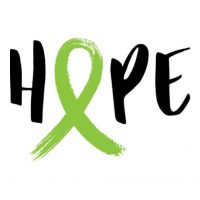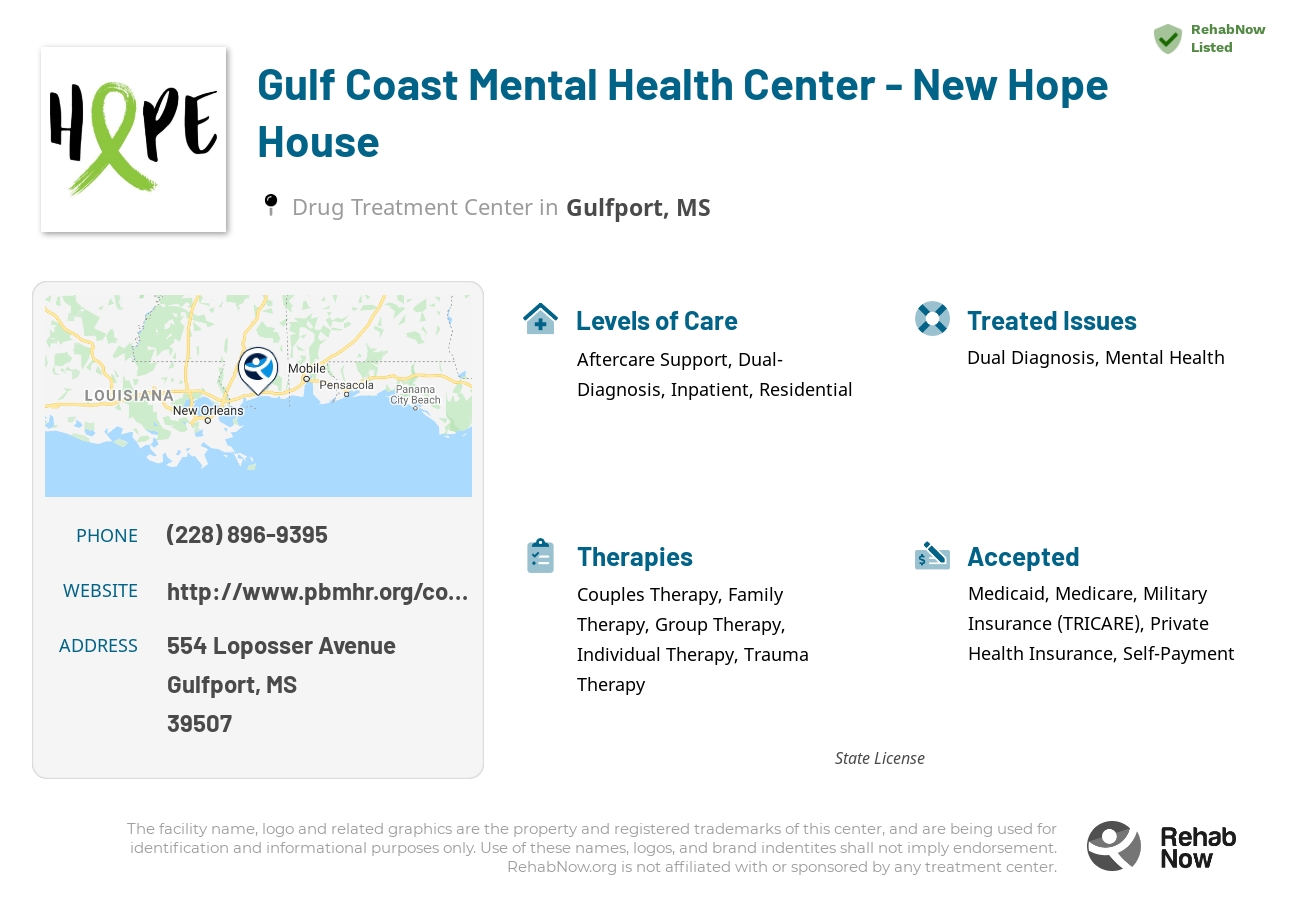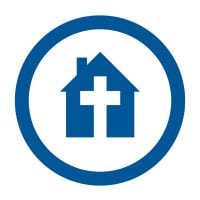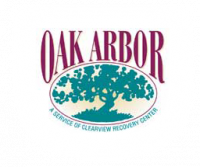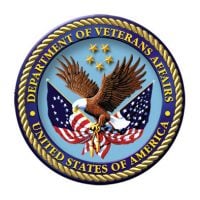Gulf Coast Mental Health Center - New Hope House
Drug Rehab Center in Gulfport, Mississippi
Gulf Coast Mental Health Center - New Hope House is a non-profit counseling agency specializing in addiction and mental health treatment through inpatient and outpatient services, therapy, medication management, and specialized clinical treatment with CARF accreditation and community outreach programs.
About This Mississippi Facility
Gulf Coast Mental Health Center - New Hope House is a state-licensed, non-profit counseling agency located in Gulfport, Mississippi, specializing in providing treatment for individuals suffering from addiction and mental health issues. This facility features an experienced team of addiction counselors and mental health professionals dedicated to helping clients achieve long-term sobriety and mental wellness. Services provided by New Hope House include inpatient and outpatient treatment, individual and family therapy, medication management, and specialized clinical treatment such as Dialectical Behavioral Therapy.
New Hope House provides a safe, supportive, and nurturing environment that helps clients learn how to cope with the underlying issues causing their addiction. Clients are empowered to develop new life skills and strategies to cope with the stresses and triggers of everyday life. Experiential therapy, group therapy, and peer support are also used to help clients manage their recovery and gain insight into their addiction. Additionally, New Hope House offers dual diagnosis treatment for individuals with both mental health and substance abuse issues.
Gulf Coast Mental Health Center - New Hope House is CARF (Commission on Accreditation of Rehabilitation Facilities) accredited and has been featured in various media outlets, including the Sun Herald and Mississippi Pulse. The facility also offers continuing education classes and community outreach programs, such as their partnership with the James Cox Mental Health Center in Gulfport. New Hope House is dedicated to providing comprehensive, evidence-based treatment for individuals living with addiction, and strives to help clients develop the skills needed to live a healthy and productive life.
Genders
Ages
Modality
Additional
Accreditations
State License
Conditions and Issues Treated
Dual Diagnosis refers to someone who is both dealing with addiction and another mental health issue.
There are different kinds of Dual Diagnosis: A person who simultaneously experiences both a mental illness and an addiction disorder. Or, a person who experiences one or more coexisting (simultaneous) mental health conditions in addition to a primary substance use disorder.
Some conditions that commonly co-occur with addiction include:
- Personality Disorders (Borderline, Narcissistic)
- Mood Disorders (Bipolar Disorder, Depression, Anxiety Disorder)
- PTSD (Post Traumatic Stress Disorder), OCD (Obsessive Compulsive Disorder), ADHD (Attention Deficit Hyperactivity Disorder)
- Schizophrenia, Psychosis, Hallucinations, Delusions
Levels of Care Offered at Gulf Coast Mental Health Center - New Hope House
This center offers a variety of custom treatment tailored to individual recovery. Currently available are Aftercare Support, Dual-Diagnosis, Inpatient, Residential, with additional therapies available as listed below.
Individuals who are suffering from severe addiction or have a high risk for dangerous health concerns are often recommended to receive inpatient treatment.
Choosing to enter an inpatient treatment program is beneficial for people who are suffering from severe addiction, or who have a high risk for dangerous health concerns.
Inpatient treatment is beneficial for:
- People who have a history of severe withdrawal.
- People who have attempted to overcome addiction on their own without success.
- People who have a history of relapse, or have recently relapsed.
- People at risk for drug overdose or withdrawal-related complications.
- People with medical conditions that are worsened by drug or alcohol use.
Residential treatment programs are those that offer housing and meals in addition to substance abuse treatment. Rehab facilities that offer residential treatment allow patients to focus solely on recovery, in an environment totally separate from their lives. Some rehab centers specialize in short-term residential treatment (a few days to a week or two), while others solely provide treatment on a long-term basis (several weeks to months). Some offer both, and tailor treatment to the patient’s individual requirements.
People who have completed a rehab program often need continued support from the addiction treatment team in order to remain abstinent from drugs and alcohol. Aftercare can be beneficial for personal, social, and emotional growth.
Common aftercare options include:
- Individual Therapy – this type of addiction counseling is available on a one-on-one basis. This can be beneficial for people with a high degree of emotional turmoil and a strong desire to overcome addiction.
- Group Therapy – this type of addiction counseling is available in a group setting. This type of treatment can be beneficial for people who are unable to attend regular therapy appointments due to other responsibilities.
- Family Therapy – this type of addiction counseling is available to the family members of addicts. This can be beneficial for people who are unable to fully comprehend what their loved ones are experiencing due to addiction.
Therapies & Programs
Therapy sessions focused on the individual addict can provide much-needed guidance as they work toward overcoming their addiction. These types of sessions typically involve guidance from a therapist, who will help addicts identify and process their feelings and cravings.
During these sessions, addicts may develop plans for coping with the triggers that typically lead to relapse and learn how to avoid those triggers during their recovery process.
If you are looking for drug recovery, couples therapy can be a great option. This type of therapy can help rebuild trust and joy in relationships that may have been damaged by addiction. It can also help reduce the dysfunctional behavior in a relationship that may trigger addiction. A patient’s partner will be involved in the process. They can also benefit from therapy, especially if they are trying to live with an addict.
The main goal of family therapy for drug addiction is to create an environment where communication can occur without judgment, hostility, or blame that often occurs within a family.
Family therapy is a type of group problem-solving that aims to improve communication and relationships between the patient, their family, and sometimes friends. The therapist is with the family as they learn to communicate with each other differently, especially with the addict when s/he is using.
The family can learn to reduce their enabling behavior or rally together and support each other during tough times. The patient also learns how to deal with their addiction and maintain sobriety while interacting with the family.
Different types of addiction treatment services are available. Within this article, group therapy is of interest due to its high success rate compared to individual therapy. Group therapy settings are beneficial because they allow recovering addicts to build a strong support network.
Benefits of group therapy are:
- Reduces feelings of isolation
- Immediate access to social support in the form of fellow addicts in recovery
- Lowers risk of relapse
- Increases rate of sobriety
- Builds coping skills that can be applied to everyday life
Trauma Therapy is a form of therapy that involves working with a patient to help them process and understand the past trauma(s) in their life. The idea behind it is that while some people can experience traumatic events and not have lasting psychiatric symptoms, many others will. In these cases, memories of the event get hidden from consciousness but continue to influence how the person processes and copes with things in their life. They may avoid situations that resemble what happened or become suddenly angry or irritated to a situation that reminds them of a past event.
With the help of a therapist, people can go back over memories and experiences. This helps them understand why they are having problems coping with certain situations and how they can change how they think and react to things. This therapy is typically done using techniques such as visualization, discussion, and writing down thoughts and feelings.
Trauma therapists will work with clients to help them understand their past and present relationships. Many times, patients may believe that something is inherently wrong with them or that they are unworthy of love. A therapist aims to correct these negative feelings and behaviors by helping the person realize that their actions do not reflect who they truly are.
One of the main goals of trauma therapy is to help clients express their emotions and talk about what they are feeling. This benefits both to increase awareness of how certain events have impacted them in the past and enables patients to realize that they can make changes in their lives.
Cognitive Behavioral Therapy (CBT) is used by drug treatment centers to help addicts comprehend the causes of their substance abuse and the consequences that follow. Through CBT, clients learn to recognize and avoid high-risk situations and cope with challenging situations when they arise.
CBT treatment often includes a combination of individual therapy, group therapy, lectures, and other activities. The treatment’s goal is to help addicts gain self-control and maintain abstinence from drugs and alcohol over the long term so that an addict can get sober and lead a more productive life.
CBT is particularly effective in helping people overcome their drug problems, especially people whose drug abuse is motivated by self-defeating beliefs and emotions.
Payment Options Accepted
For specific insurance or payment methods please contact us.
Is your insurance accepted?
Ask an expert, call (888) 674-0062
Pine Belt Mental Health Resources Associated Centers
Discover treatment facilities under the same provider.
- Pine Belt Mental Healthcare Resources - Hattiesburg in Hattiesburg, MS
- Pine Belt Mental Healthcare Resources - Laurel in Laurel, MS
- Gulf Coast Mental Health Center - Venture House in Long Beach, MS
- Pine Belt Mental Healthcare Resources - Columbia in Columbia, MS
- Pine Belt Mental Health for Children - Hattiesburg in Hattiesburg, MS
Learn More About Pine Belt Mental Health Resources Centers
Additional Details
Specifics, location, and helpful extra information.
Gulfport, Mississippi 39507 Phone Number(228) 896-9395 Meta DetailsUpdated November 25, 2023
Staff Verified
Patient Reviews
There are no reviews yet. Be the first one to write one.
Gulfport, Mississippi Addiction Information
Mississippi has one of the highest rates of drug and alcohol abuse-related deaths. Approximately 350,000 residents use illicit drugs every year while another 108,000 abuse alcohol. In one year, doctors in Mississippi prescribed 76.8 opioid prescriptions for every 100 persons. This compares to the national rate of 51.4 prescriptions.
Treatment options for drug addiction vary depending on the person's needs. Inpatient rehab programs provide 24-hour care and supervision in a hospital-like setting. 12-step programs are based on the Alcoholics Anonymous model and emphasize peer support and group meetings. There are many different types of drug rehabs, so it is important to find one that understands your specific addiction.
Treatment in Nearby Cities
- Carthage, MS (164.6 mi.)
- Decatur, MS (141.7 mi.)
- McComb, MS (102.6 mi.)
- Richton, MS (66.5 mi.)
- Magnolia, MS (99.1 mi.)
Centers near Gulf Coast Mental Health Center - New Hope House
The facility name, logo and brand are the property and registered trademarks of Gulf Coast Mental Health Center - New Hope House, and are being used for identification and informational purposes only. Use of these names, logos and brands shall not imply endorsement. RehabNow.org is not affiliated with or sponsored by Gulf Coast Mental Health Center - New Hope House.
